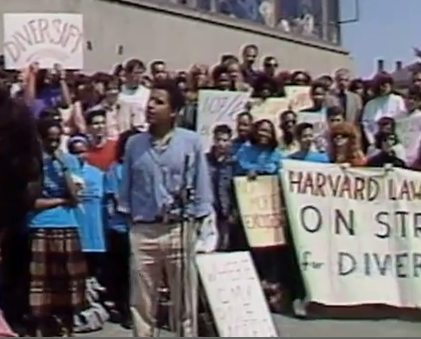
I spent most of my time at Harvard College (1995-1999) in a decidedly radical frame of mind. I took classes with Cornel West, organized demonstrations, and engaged in polemics with Tom Cotton, one of the campus’s few conservatives (now leading a splendid campaign for Congress as the Republican nominee in Arkansas’s fourth district). My favorite outlet, however, was writing–essays, op-eds, term papers, monologues.
Much of it was tedious, derivative, verbose–and, in retrospect, embarrassing. My only mildly successful effort was a half-ironic harangue in the Harvard Crimson in 1998 on the revolutionary importance of streaking Harvard Yard the night before exams: “From the roaring din and flapping flesh of the midnight hour, we conjure forth the revolutionary spirit, to remind ourselves that it still exists behind the red-brick walls of the ivory tower. Plus, everyone’s naked, and that’s a big bonus.”
The stuff I took more seriously was truly frightening. I recently had occasion to look through a few of my old collegiate papers. One presented an idea for educating the public about climate change using Galilean dialogues. Another suggested that the media adopt methods of “transformative communication” that would prepare the public for radical institutional changes and “a new array of national symbols” that stressed “collaborative efforts and community life” over “rugged individualism.”
If those concepts sound vaguely familiar, if crazy, that’s because I was drawing from the same wells that slaked young Barack Obama’s intellectual thirst, and which later produced such epigrams as “spread the wealth around” and “you didn’t build that.”
One thing I shared with Obama and “guy who lives in my neighborhood” Bill Ayers–other than Chicagoland origins–was an antipathy towards the suburbs in which I had been raised. The most radical essay I wrote was a freshman term paper in which I proposed a plan to end “geographic segregation” through “communitarian redress of racial inequality and class difference.” The first step would be “[t]he elimination of the school district system as the structure for public education at the secondary level, and its replacement with a system of communal, public boarding schools.”
I also proposed getting rid of an inflation-targeting monetary policy, creating jobs through federally-subsidized industries, and the “encouragement of a high level of sustained political activism” necessary to keep everyone committed to the program.
I received an “A” on the paper; perhaps I should also have applied to Obama and Ayers for a grant from the Woods Fund. In addition to eliminating the school district system, which “sequesters economic resources for education (and thus education itself) in the most affluent areas,” I suggested indoctrinating adolescents with new identities “best suited to the carrying out of a communitarian reform program.”
That was sixteen years ago, the year Obama was elected to the Illinois legislature. I gradually left all that behind–partly because left-wing politics turned out to be conformist and boring, and partly because anyone who really does want to see the world improve must eventually realize that trying to control other people’s choices is a sure-fire way to fail. I’m not sure how Obama avoided that lesson, but he has.

COMMENTS
Please let us know if you're having issues with commenting.